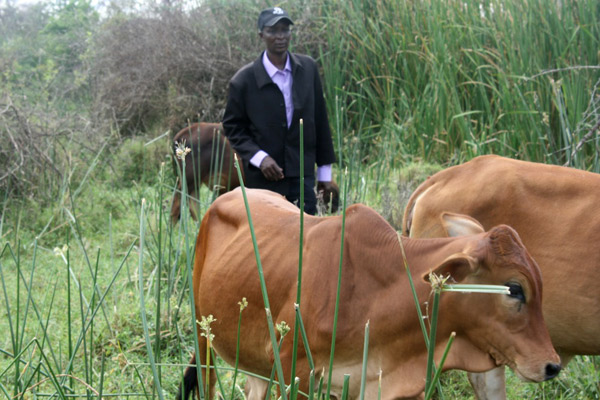As you drive deep into Araban village in Baringo, nothing prepares you for modern livestock breeding.
Across the land, large herds of cattle graze in the bushes.
But arriving at Dickson Lenasolio’s ranch, the script changes.
He has risen against the local pastoralism culture to not only embrace modern ranching and beef farming, but also to run a business.
Before he started keeping sahiwalbreed, Mr Lenasolio had tried his hand in politics.
But his short stint in politics gave him a mixed bag of fortunes.
“There always arose complains that I was favouring one tribe or the other no matter how I tried to be fair,” he says.
And on quitting politics in 2007, Mr. Lenasolio ventured into beef farming.
He would buy a bull at about Sh10,000 and resale it for Sh15,000 after fattening it for three months.
However, profit-sapping middlemen took note, and quite often, they dictated the price.
The turn of events hit Mr. Lenasolio hard prompting him to turn to dairy farming.
Interestingly, many of his neighbors keep beef cattle.
Brokers were not the only challenge since he had to relocate to Araban village recently after he was displaced by floods in Salabani village, around Lake Baringo, where he had called home for decades.
He invested Sh52,000 in buying a Jersey cow at Kabarak farm — over 100 kilometers away from his home.
“Initially, the cow produced a lot of milk which I supplied to a hotel in Marigat town,” he said, adding, “but the production reduced sharply during the dry season to my disappointment.”
Less expensive
But determined to make a difference in the cattle business, Mr. Lenasolio researched on good breeds that do well in arid and semi-arid areas.
A veterinary doctor from the Kenya Agricultural Research Institute (KARI) advised him to give sahiwal breed a try.
Besides being less expensive to maintain, the breed would earn him more profit.
According to KARI, the main breeder and seller of sahiwal, the breed has many advantages over the traditional cattle.
On account of his returns, Mr Lenasolio will never regret the journey he made to start a ranch and beef farming.
He invested in Sh75,000 sahiwal bull. His next stop was at KARI, in Naivasha, where he bought seven heifers.
Today, he breeds both pure sahiwal and a crossbreed of sahiwal and zebu — the native cattle.
Since he started breeding sahiwal in 2008, Mr. Lenasolio has sold three bulls at Sh120,000 each and over 30 calves, some pure while others are crossbreeds.
“I sell pure sahiwal calves aged one year at Sh40,000 while crossbreeds go for Sh30,000,” he said.
His customers are farmers from as far as Narok, Transmara, Maralal among other arid and semi-arid areas.
An animal health expert at KARI, Mr. John Kimeto, said sahiwal is more disease resistant than zebu.
The breed also matures faster than the traditional ones and produces up to five times the amount of milk the native breeds produce daily.
“Sahiwals are very fertile and can give birth every 11 months unlike kienyeji (traditional) breeds which can take over two years,” said Mr Kimeto who is based at KARI, in Marigat town.
Mature sahiwal bull weighs about 600 kilograms — twice the average weight of a zebu cattle.
For Mr. Lenasolio, his beef farming business is not just about money, “recently, the principal of one of the top high schools in Kenya offered me Sh150,000 for a bull, but I turned him down because I did not need money at that time,” he notes.
The joy about his business is that he is able to pay school fees for his nine children that cost an average of Sh400,000 per year.
He said he had taught his wife cattle breeding because he believes in women empowerment.









